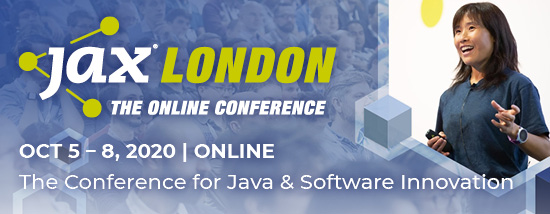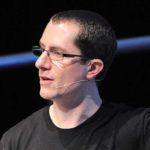A research study by The National Center for Women & Information Technology showed that “gender diversity has specific benefits in technology settings,” which could explain why tech companies have started to invest in initiatives that aim to boost the number of female applicants, recruit them in a more effective way, retain them for longer, and give them the opportunity to advance. But is it enough?
Four years ago, we launched a diversity series aimed at bringing the most inspirational and powerful women in the tech scene to your attention. Today, we’d like you to meet Abigail Ramlogan, Marketing product evangelist at NetBrain.
Today’s Woman in Tech: Abigail Ramlogan, Marketing product evangelist at NetBrain
 With over a decade of experience as a Network Engineer, Abigail Ramlogan is a fierce advocate for “working smarter, not harder” through network automation. She is the Product Evangelist at NetBrain, the leading solution for transforming network operations from human-centric to automation-centric. Abigail spearheaded the company’s hands-on Test Drive environment and manages thought leadership for its social media platforms.
With over a decade of experience as a Network Engineer, Abigail Ramlogan is a fierce advocate for “working smarter, not harder” through network automation. She is the Product Evangelist at NetBrain, the leading solution for transforming network operations from human-centric to automation-centric. Abigail spearheaded the company’s hands-on Test Drive environment and manages thought leadership for its social media platforms.
When did you become interested in technology? What first got you interested in tech?
Technology is so important to everything we do in our everyday lives. Tech makes life much more efficient i.e. COVID and remote working. My interest in technology began long ago, but the point at which I knew I wanted to immerse myself in the industry was after I took a part-time job during my master’s program.
I had a part-time job working on campus doing websites and IT. I remember feeling really sad about my original master’s program’s field of study, and my work at my part-time job was more fulfilling. I enjoyed my job so much I knew at that point the tech industry was where I needed to be. I walked over to the information science and technology department and requested a program change. At the time, there was a 24-hour window and very slim chance of me getting in the program, but I was able to talk to the head leaders of the department and get any issues I would have faced resolved. Through my tenacity, they could see my passion for technology. It was and still is the best choice I’ve ever made.
How did you end up in your career path? What obstacles did you have to overcome?
I am originally from Trinidad & Tobago, and in our culture we emphasize the importance of math and science. If you are good in either it is expected to go into the medical field or engineering. Growing up, I was really good at math. As the daughter of an engineer, it was essentially destined I would become one.
In undergrad, I studied and received a bachelor’s degree in computer engineering. As mentioned previously, I later received a master’s degree in information science and technology. I worked as an engineer and consultant for over a decade at companies like Norwegian Cruise Line, Hotwire Communications, and USAA.
I was first introduced to NetBrain through a former colleague after Norwegian Cruise Line acquired another cruise line who used NetBrain’s network automation platform. I worked for two other companies that also used NetBrain’s product, but I felt my purpose was in working with NetBrain directly so I decided to join the cause.
At a previous job I had prior to NetBrain, I experienced a family emergency that I took some time off work to handle. I had discussed my situation with my manager, and they were so understanding and accommodated me. Later during this time, there was a team shift and my new team lead was less understanding of my situation because of their personal experience in the industry of being married to the job. I tried negotiating my role to no avail, but ultimately felt I was given two options: choose family and resign or get back to work full time. That was the biggest obstacle I ever had to overcome, and as scary as it was, it was a no-brainer to resign. I was fortunate enough to find a new job with a better work culture quickly.
Did you receive support from your family and friends? Do you have a role model?
I am surprised by the question about receiving support because outside of the previously mentioned situation, I would say for most of my career in tech I have felt well supported and well respected, even working in male-dominated spaces. I was very fortunate to have the support of not only my family and friends, but many of my colleagues as well. My parents are also my biggest cheerleaders. Because of these positive relationships I have never felt like I was doing something a woman shouldn’t do.
When I think of role models, two things come to mind: the life of Jesus and my family. As a Christian, the life of Jesus is an example that governs everything I do in life and in my career. By my desk I have a quote that states “whatever you do, do it with all your heart.” I give all that I have to improve the lives of engineers. As for my family, I take a piece of them wherever I go – the brilliant mind of my father, the kind heart of my mother, and the gentle spirit of my brother.
As for my family, I take a piece of them wherever I go – the brilliant mind of my father, the kind heart of my mother, and the gentle spirit of my brother.
Did someone ever try to stop you from learning and advancing in your professional life?
Outside of the situation where I had to choose to either resign or go back full-time during a family emergency, I cannot think of any time where someone tried to stop me from learning or advancing professionally. I am blessed to not have had to deal with those hurdles. Despite working in a male-dominated industry, the only obstacle I’ve had to deal with is some unhealthy competitiveness from individuals, which I think is just a byproduct of the field and not specific to me.
A day in Abigail’s life
I am a fierce advocate for network automation and simplifying the lives of network engineers. Through my prior experience as an engineer and belief in NetBrain’s overall mission, I was hired to be the product evangelist at the company. My work experience at other companies daily inspires how I create content in my current role.
My role is rooted in marketing and recently, I led the project for Test Drive, NetBrain’s live virtual environment that has step-by-step guidance allowing IT professionals to experience network automation first hand. Projects like this make what I do feel less like a job, and I am proud of the work I get to do.
Other parts of my role consists of thought leadership on NetBrain’s social media platforms for Facebook, LinkedIn, and Twitter, as well as producing practical, engaging how-to videos of how to use NetBrain daily.
What are you most proud of in your career?
I am most proud I stayed steadfast in my mission to empower network engineers, especially women, to improve their quality of life through the adoption of automation. I am proud to be working for a company whose mission I truly believe in.
I am in a unique position having been a network engineer. My exposure to so many companies and experiencing the engineering lifestyle aids me in my current position to make a difference. That matters to me because it is not just about money or getting recognition for doing good work. For me, it’s actually making a difference in people’s personal lives.
I am guided by a quote in the Bible that states “let all that you do be done in love.” I take it with me wherever I go and it influences how I view my work, how I conduct my work, and how I treat people within my work. I feel I am making a profound difference in the field by evangelizing NetBrain and changing the way network engineers do their jobs for the better.
Why aren’t there more women in tech?
There are a number of factors for why there aren’t more women in tech. One of the main factors is that the industry doesn’t foster environments where women can flourish. There are impractical expectations on how people can manage their career and home life. The first female network engineer I met was eight years into my career, and she, like many others, was married to her job. I’ve met other women who started as engineers, but later transitioned into project management roles because of the toll the field takes when trying to create work-life balance.
A common expectation is that people have to decide between prioritizing work or their personal lives, and when women do decide to have families, many of them struggle due to the required after hours on-call and night work. If they take a break from the field to start their families, it is difficult for them to return due to the gaps in their work experience.
Could you name a few challenges (or obstacles) women in tech face?
One of the biggest challenges women face in our industry is that professionals and hiring managers have a hard time understanding the different challenges women have to balance, especially when deciding to start families.
Of the women I know in engineering, I can count only two that started families while managing their careers. One of the women was eight months pregnant at the time and had to climb ladders to maintain network equipment. Women are strong and resilient, but when they are pregnant they can’t be on-call, go out into the field or be up at odd hours of the night for network maintenance.
Women carry a different load of responsibilities when having to juggle their home, their families, and their work. They are often forced to choose between being married to their work or married to their families. Men don’t bear that same societal expectation to make those compromises or sacrifices.
As a woman who has been in this industry for more than a decade, I would love to see not just more women, but more race and ethnicity inclusion.
Would our world be different if more women worked in STEM?
Our world would absolutely be different if more women worked in STEM. Right now, STEM is a boy’s club and can be very isolating, especially socially. I can recall times where I had to weigh whether I wanted to be the only woman sitting at a table of my all-male engineering colleagues in order to socialize after work or go home. There were even times I would skip lunch because I didn’t want to be the only woman at the table or in the room.
Having more women in STEM would greatly impact our social climate and work culture in the industry. It would allow those previously few women in the field to better advocate for themselves. Socialization and conversations would be different. Implementing something as simple as boundaries or work-life balance would foster better relationships between colleagues and management and better environments between men and women in the workplace. It would also improve family life and by extension our communities.
The discussion about diversity is gaining momentum. How long will it take to see results from the current discussion?
I am unsure of how long it will take to see diversity increase in the tech industry, but I do believe it is an important and worthy cause. As a woman who has been in this industry for more than a decade, I would love to see not just more women, but more race and ethnicity inclusion. I rarely see Black American engineers, especially Black women.
Seeing people from different racial and ethnic backgrounds in engineering allows for the industry to grow and have a diverse exchange or group of perspectives. Our perspectives are what greatly impacts how tech functions, so diversity is greatly needed. This could be possible through company incentives, and with companies expanding, leveraging, and being more accommodating to remote work globally. This is something I love about NetBrain.
What advice (and tips) would you give to women who want a tech career?
Women should know this industry is rewarding. If you are a strong woman and stand up for what is right, you can make a difference. As a strong woman in tech, there are many men who will respect you as a voice of authority and leadership. While there are obstacles to overcome, the reward outweighs the challenges.
Before entering the industry I would have loved to know more about the lifestyle of a network engineer, so I think it is important for women who want a career in tech to learn the day-to-day practicalities of the roles. Find out from other women in the industry how they tackle their job responsibilities, their corporate environment, and the effects the job has on their person and family life. If given the opportunity, it is important for women to do internships to get that real-world experience.
More Women in Tech:
- Women in Tech: Anna Stoilova, Co-founder & Chief Product Officer at TIKI
- Women in Tech: Priscila Oliveira, software engineer at Sentry
- Women in Tech: Dr. Karen O’Brien, Global SAP Product Development Director, HCL SAP Practice
- Women in Tech: Hadas Weinrib, Head of Marketing, Lightspin
- Women in Tech: Nahid Akhtar, Data Engineer at McMakler
The post Women in Tech: “The reward outweighs the challenges” appeared first on JAXenter.
Source : JAXenter
























